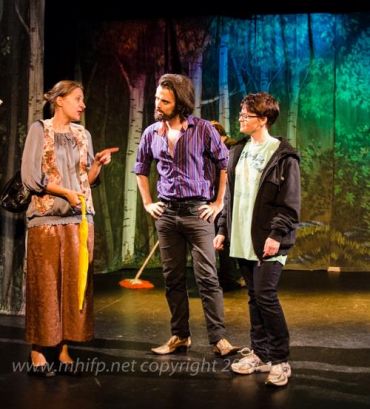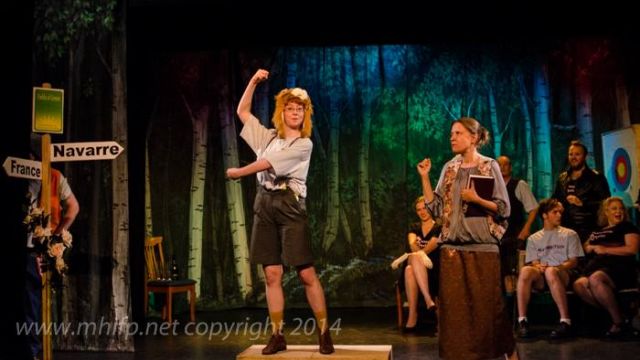Love's Labour's Lost
There are those who consider Shakespearean theatre to be a pure pleasure, and those who would classify it as pure torture. This particular critic does not subscribe to either extreme, finding the language of the times an admitted challenge, but the kind of challenge that a skilled group of theatre practitioners can turn into a golden experience that enriches the viewer in a way that few other writers can.
A Company of Strangers have taken one of the Bard's lesser-known comedies (one with a somewhat mean and bitter edge that is rather bracing) and, in the face of adversity (more on that later), made a pleasurable and engaging entertainment out of it.
Needless to say, it's all about "lurve" - though very little in the play could be described as romantic or idealistic or sweet. It begins with a number of young men (one a king) swearing to abstain from love and the pleasures of women - then demonstrates (by way of a bunch of charming young ladies, one a princess) just how unrealistic and unlikely these plans are. The resultant complications, from feelings declared on paper but miscommunicated and/or disregarded, make for a typically twisty Shakespearean stew, though one that seems generally not to be regarded as a masterpiece.
 In the hands of its performers, under the direction of Geoffrey Dawes, this production succeeds, due largely to the enthusiastic - but never overplayed - comic spirit that the cast members (in the majority) manage to capture.
In the hands of its performers, under the direction of Geoffrey Dawes, this production succeeds, due largely to the enthusiastic - but never overplayed - comic spirit that the cast members (in the majority) manage to capture.
Laurence Croft, as King Ferdinand, provides the show with a strong central performance, playing a character both officious and affected, whose hypocrisies make him somehow all the more endearing. Philip Speight plays Biron with script in hand, having replaced the original actor at only a week's notice, and his performance is smoother and more confident than you'd likely expect under the circumstances, certainly enough to make one keen to see what he could do when allowed a full rehearsal period.
Jennifer Speake is a strong French Princess, ably and colourfully supported by Freyja Stokes and Asha Perry as her ladies-in-waiting (cast member Claude Creighton was absent from the performance reviewed). Director Dawes bravely - but successfully - risks irreverence by slyly incorporating a brief showcase of Speake's singing abilities with a snatch of 'Summertime' late in the play. It feels true both to her character and to the spirit of Shakespeare.
Hebe Sayce is an impressive standout in the ensemble, playing the page of Don Di Armado (an equally fine portrayal by Sean Watters). Some of the best comedy is provided by Wayne Carter as Boyet, and Spring Whelan leaves a delightful impression as Sir Nathaniel, despite her character (and that of Stef Rozitis' no-nonsense Holofernes) feeling somewhat extraneous to the heart of the text.
Then again, at the heart of Love's Labour's Lost is a story that not many would likely select as one of the Bard's top five strongest, so the very decision to take it on demonstrates Geoffrey Dawes' courage and vision. That the end result manages to be such an enjoyable ensemble piece is testament to his (and the performers') talent.
Anthony Vawser
Subscribe to our E-Newsletter, buy our latest print edition or find a Performing Arts book at Book Nook.

